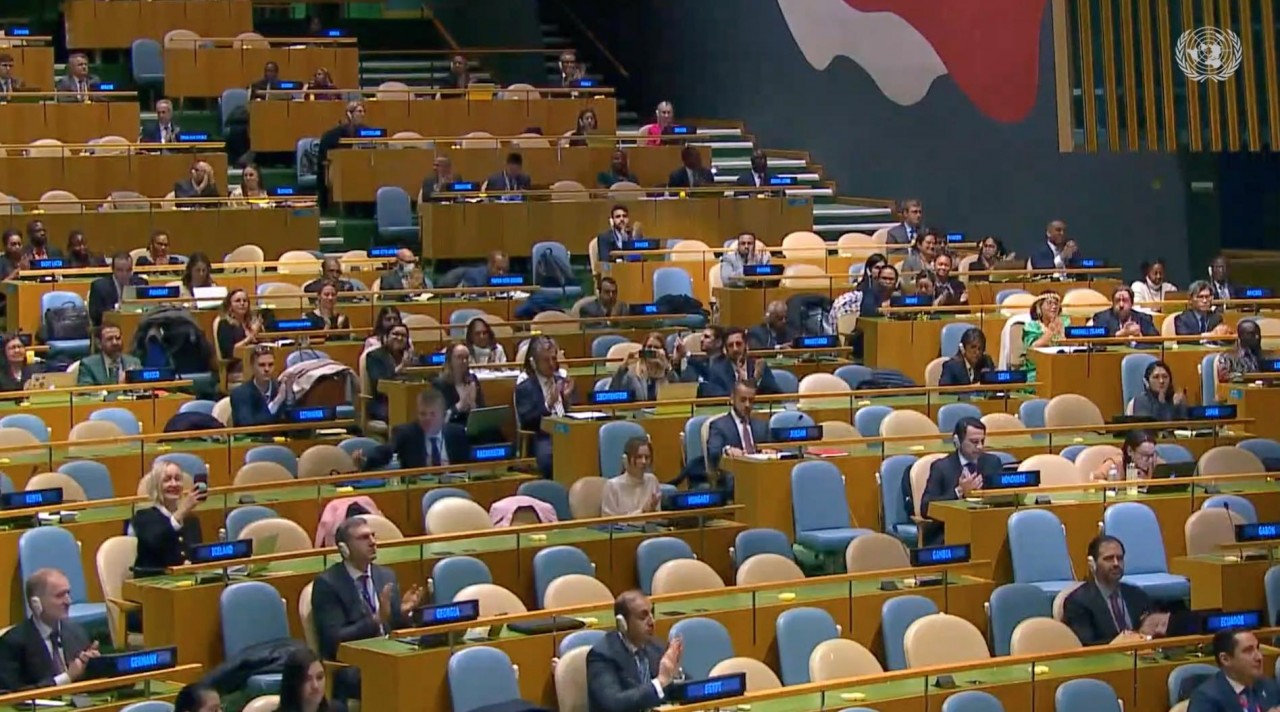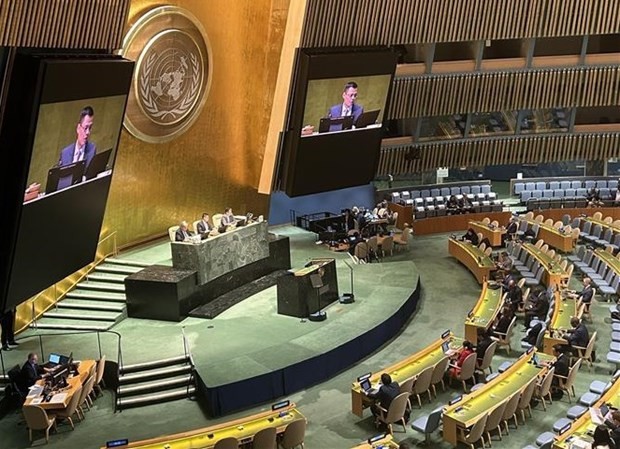 |
| Ambassador Dang Hoang Giang, Vietnam’s Permanent Representative to the United Nations (UN), as Vice-President of the UN General Assembly, adopts the resolution. Photo: VNA |
Ambassador Dang Hoang Giang, Vietnam’s Permanent Representative to the United Nations (UN), as Vice-President of the UN General Assembly, chaired its discussion and vote on a resolution asking the International Court of Justice (ICJ) to define the obligations of states to combat climate change.
The resolution was put forward by Vanuatu and a “core group” of 18 countries, including Vietnam, according to VNA.
Under the resolution, UN member states requested the world court to give opinions on the obligations of states under international law to protect the environment against greenhouse gas emissions, as well as on legal responsibilities of countries which have caused negative impacts of climate change on many other countries.
With this resolution, the ICJ will, for the first time, give its legal opinion on climate change – one of the most urgent and widely discussed issues in many regional and international forums today. The fact that the resolution was co-sponsored by 132 out of 193 UN member states and passed by consensus shows the strong support of the international community on this issue.
 |
| An overview of the UNGA discussion. Photo: VNA |
Joining the core group from the very beginning, Vietnam has actively promoted the process of making the draft resolution through nearly 50 meetings of the Group and three rounds of consultations with all UN member states.
As one of the countries worst affected by climate change, the active participation in promoting this initiative helps reaffirm Vietnam’s international commitments, as well as enhance its role as a responsible member in solving today’s global issues.
Ambassador Giang emphasised that although many response measures have been put in place to minimise negative impacts, climate change is evolving very complicatedly. Therefore, countries need to take stronger actions, including clarifying their responsibilities and obligations under international law in general and relevant international treaties in particular.
 |
| An overview of the UNGA discussion. Photo: VNA |
Vietnam’s engagement in the UN resolution that urges the ICJ to outline nations’ legal obligations related to curbing climate change disasters and their impacts on vulnerable communities proves the country’s point of view, Giang said in a recent interview with VNA right after the resolution was adopted on March 29.
The resolution, co-sponsored by 132 countries, calls on the ICJ to lay out nations’ obligations for protecting Earth’s climate, and the legal consequences they face if they don’t. The court’s opinion would be non-binding.
Giang described the adoption of the resolution as particularly significant.
First, it shows the enormous consequences of climate change and the urgency to strengthen climate change response.
Second, the urgency has become so great that it has attracted widespread international attention.
Third, the adoption of the resolution by consensus shows the advantages of the multilateral approach, upholding international law, and attaching importance to consultation and dialogue between countries.
The adoption of the resolution shows that the international community can and is more willing to take strong actions together to respond to climate change, Giang said.
Vietnam has been actively involved in promoting Vanuatu’s initiative on the resolution from the early stages, Giang said, adding that Vietnam is one of the first five members of the core group.
Vietnam actively participated in developing the draft resolution by attending nearly 50 meetings of the group from September 2022, as well as in three rounds of formal consultations with all UN member states and many other informal contacts, Giang said, adding many of Vietnam’s opinions were included in the resolution.
As Vietnam is considered one of the countries most severely affected by climate change, especially by sea level rise, its active participation in the core group to develop the resolution helps highlight Vietnam’s active policies and efforts on climate change response, including its commitment to reduce net emissions to zero by 2050.
The participation also affirms Vietnam’s active role in international mechanisms and forums on climate change, together with other countries to strengthen international cooperation on this issue, thus calling on more international support for the country in climate change responses.
In the longer term, the ICJ’s advisory opinion is likely to help countries, particularly developing countries like Vietnam have stronger measures and resources for climate change responses.
Locals join hands to plant mangrove forests
The coastal commune of Tam Hai in Nui Thanh district, Quang Nam province is vulnerable to high tides and erosion due to climate change. In order to adapt to the situation, locals have planted mangroves.








